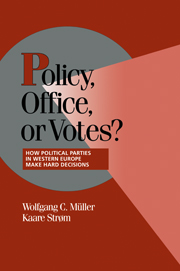Book contents
- Frontmatter
- Contents
- Figures
- Tables
- Contributors
- Chapter 1 Political Parties and Hard Choices
- Chapter 2 Office, Votes, and Then Policy: Hard Choices for Political Parties in the Republic of Ireland, 1981–1992
- Chapter 3 Party Behaviour and the Formation of Minority Coalition Governments: Danish Experiences from the 1970s and 1980s
- Chapter 4 From Policy-Seeking to Office-Seeking: The Metamorphosis of the Spanish Socialist Workers Party
- Chapter 5 Changing Strategies: The Dilemma of the Dutch Labour Party
- Chapter 6 Party Behavior in a Polarized System: The Italian Communist Party and the Historic Compromise
- Chapter 7 Decision for Opposition: The Austrian Socialist Party's Abandonment of Government Participation in 1966
- Chapter 8 Leadership Accountability and Bargaining Failure in Norway: The Presthus Debacle
- Chapter 9 Winner Takes All: The FDP in 1982–1983: Maximizing Votes, Office, and Policy?
- Chapter 10 Trade-offs in Swedish Constitutional Design: The Monarchy under Challenge
- Chapter 11 Parliamentary Rules and Party Behavior during Minority Government in France
- Chapter 12 Conclusions: Party Behavior and Representative Democracy
- Index
- Titles in the series
Chapter 2 - Office, Votes, and Then Policy: Hard Choices for Political Parties in the Republic of Ireland, 1981–1992
Published online by Cambridge University Press: 05 May 2010
- Frontmatter
- Contents
- Figures
- Tables
- Contributors
- Chapter 1 Political Parties and Hard Choices
- Chapter 2 Office, Votes, and Then Policy: Hard Choices for Political Parties in the Republic of Ireland, 1981–1992
- Chapter 3 Party Behaviour and the Formation of Minority Coalition Governments: Danish Experiences from the 1970s and 1980s
- Chapter 4 From Policy-Seeking to Office-Seeking: The Metamorphosis of the Spanish Socialist Workers Party
- Chapter 5 Changing Strategies: The Dilemma of the Dutch Labour Party
- Chapter 6 Party Behavior in a Polarized System: The Italian Communist Party and the Historic Compromise
- Chapter 7 Decision for Opposition: The Austrian Socialist Party's Abandonment of Government Participation in 1966
- Chapter 8 Leadership Accountability and Bargaining Failure in Norway: The Presthus Debacle
- Chapter 9 Winner Takes All: The FDP in 1982–1983: Maximizing Votes, Office, and Policy?
- Chapter 10 Trade-offs in Swedish Constitutional Design: The Monarchy under Challenge
- Chapter 11 Parliamentary Rules and Party Behavior during Minority Government in France
- Chapter 12 Conclusions: Party Behavior and Representative Democracy
- Index
- Titles in the series
Summary
INTRODUCTION
In comparison with some other West European countries, the Irish party system has always seemed to stand out as an example of the competitive office-seeking model of party behaviour. In a system of government formation in which the bargaining environment was always constrained to a choice between single-party Fianna Fáil governments or a coalition of almost the entire opposition, it seemed clear that office motivations would tend to prevail over considerations of policy compatibility. Since for most of the period Fianna Fáil was assumed to be centrist on the key socioeconomic policy dimension, any potential coalition was by definition spatially unconnected. Gallagher observes that “Fianna Fáil and Fine Gael had been catch-all parties while the phrase was still a glint in Kirchheimer's eye” (1981: 271), and Farrell sums up the prevailing opportunistic thesis when he says that “in the main, Fine Gael and Labour have at best accepted coalition as a necessary evil, the essential price for replacing Fianna Fáil in government” (1983: 257).
That said, Irish political parties have had to face strategic choices that have had quite dramatic effects on their electoral success, coalition alliances, government incumbency, and, not to forget, the longevity of their leaders as leaders. Since we can only evaluate the choices made in terms of those available, the first section of this chapter sets out in a relatively brief manner the broad strategic context in which Irish political parties have operated. It concentrates on the main institutional and behavioural constraints that are likely to have been important in shaping the parties' trade-offs between votes, office, and policy.
- Type
- Chapter
- Information
- Policy, Office, or Votes?How Political Parties in Western Europe Make Hard Decisions, pp. 36 - 62Publisher: Cambridge University PressPrint publication year: 1999
- 8
- Cited by

